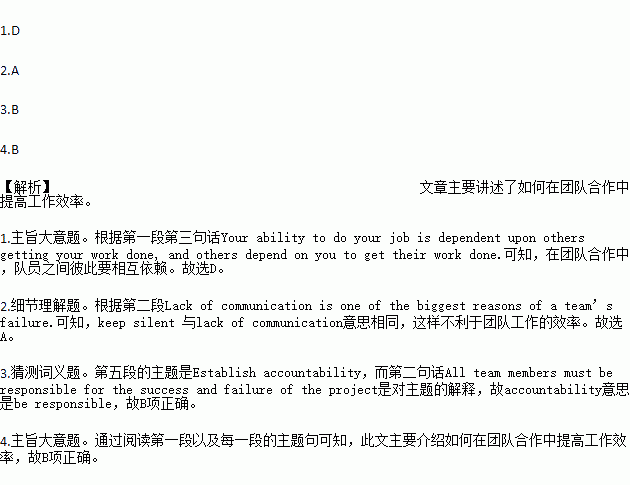题目内容
Working well in a team requires full cooperation. It’s an important skill for almost every employee to have. Your ability to do your job is dependent upon others getting your work done, and others depend on you to get their work done.
Communicate well. Lack of communication is one of the biggest reasons of a team’s failure. Seek input from team members so they fell like a valuable part of the team. Communication establishes trust among team members. In addition, communicating well can help prevent and resolve conflict. Meet regularly to keep members involved and aware of your work progress. Post decisions where everyone in the team can see them.
Be flexible. In teamwork, priorities and responsibility can change instantly. Stay ready to shift focus. Training team members to be able to do parts of other team member’s jobs can be a valuable part of teamwork; being flexible helps to build appreciation for all the parts of the team.
Meet deadlines. Work hard to ensure you meet established deadlines when you work in a team environment. Others are depending on your work. Negotiate timelines with your teammates at the start of a project. Doing so allows you to have a say in how work gets accomplished.
Establish accountability. All team members must be responsible for the success and failure of the project. Although every team doesn’t need a leader, teams require a formal way to ensure everybody does his part. Try using meetings to report on progress.
Celebrate accomplishments and encourage the team. Senior executives may not always recognize the importance of some team members’ work. Share congratulations at team meetings and talk about whose work are invaluable in helping you get your work done.
1.What can you conclude from the first paragraph?
A. Working in a team means your work is separate.
B. Working in a team means your work is effective.
C. Being a member of a team means your work is independent.
D. Being a member of a team means your work is interdependent.
2.Which of the following deeds does not contribute to effective teamwork?
A. Keeping silent in a team discussion.
B. Being able to do parts of others’ job.
C. Acknowledging others’ work publicly.
D. Holding meetings to report on progress.
3.What does the underline word “accountability” refer to in the fifth paragraph?
A. Success B. Responsibility
C. Insurance D. Community
4.What is the best title of the passage?
A. How to Succeed in Communicating with Others
B. How to Work Effectively in a Team Environment
C. Ways to Work Well in Completing Projects
D. Ways to Improve the Efficiency of Employees
 第三学期赢在暑假系列答案
第三学期赢在暑假系列答案 学练快车道快乐假期暑假作业新疆人民出版社系列答案
学练快车道快乐假期暑假作业新疆人民出版社系列答案

 since the first settlers arrive. It was a national ball what was liked by many Americans at that time. Although baseball possibly developed from an English game, it is now thought of like an American sport. From the Little League to the Major League, player of all skill levels enjoy testing their power on the “ Field of Dreams”. Famous players, exciting music but the standard stadium food of hot dogs, popcorns and peanuts are popularly among Americans. In a fact, Americans make go to the baseball game a favorite summer outing for many Americans nowadays.
since the first settlers arrive. It was a national ball what was liked by many Americans at that time. Although baseball possibly developed from an English game, it is now thought of like an American sport. From the Little League to the Major League, player of all skill levels enjoy testing their power on the “ Field of Dreams”. Famous players, exciting music but the standard stadium food of hot dogs, popcorns and peanuts are popularly among Americans. In a fact, Americans make go to the baseball game a favorite summer outing for many Americans nowadays. They are afraid of change so they find no cheese.
They are afraid of change so they find no cheese.